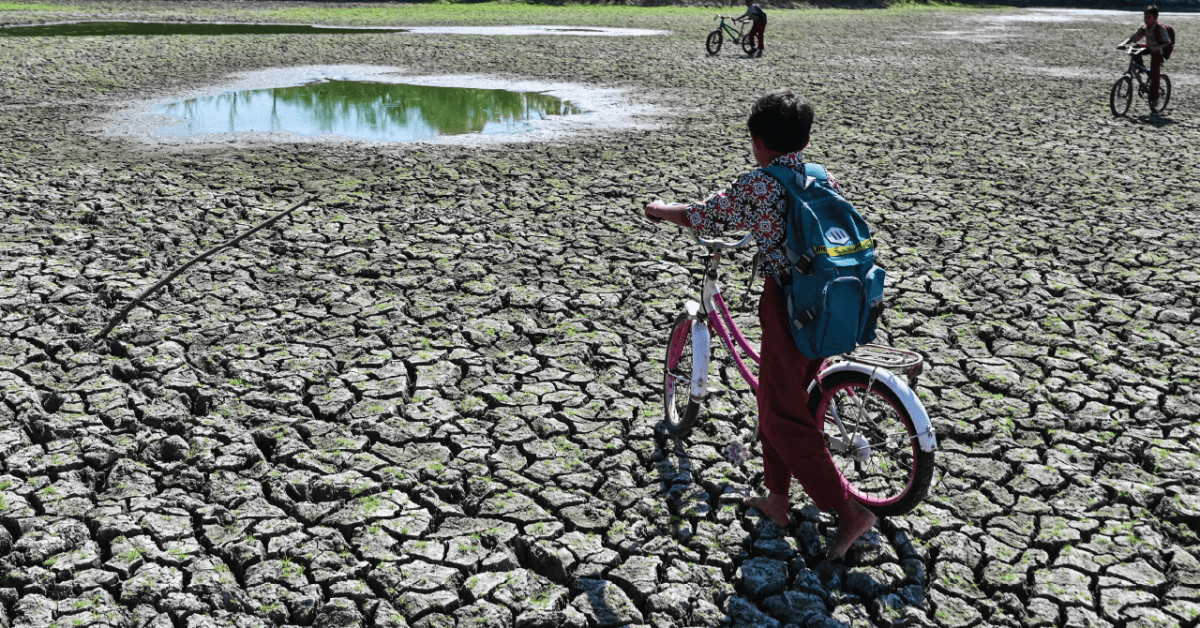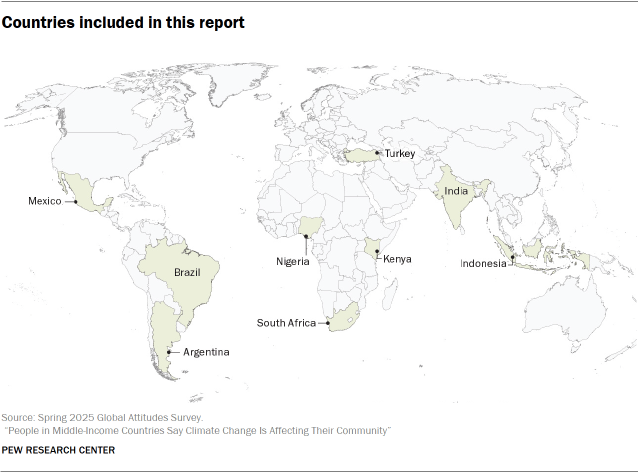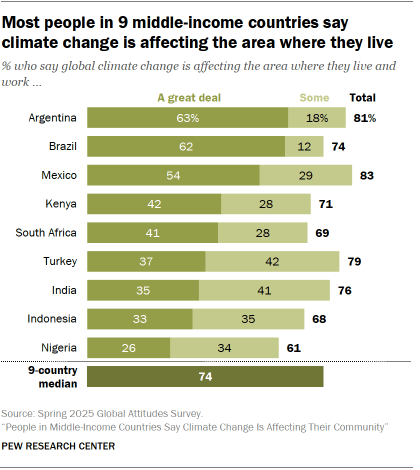
A new survey of nine middle-income nations finds widespread concerns about climate change. Large majorities in these countries say global climate change is affecting the area where they live. In the three Latin American nations polled, around half of adults or more say it is affecting their community
a great deal.
What is a median?
In this analysis, median scores are used to help readers see overall patterns in the data. The median percentage is the middle number in a list of all percentages sorted from highest to lowest.
Most people in these countries also say they are willing to make at least some adjustments to the way they live and work to reduce the effects of climate change. And most have at least some confidence in the international community to address this issue.
Impact of climate change
A median of 56% of adults across nine middle-income countries say they are very concerned that global climate change will harm them personally in their lifetime. About six-in-ten or more hold this view in Argentina, Indonesia, Kenya and South Africa, compared with about a third in Turkey.
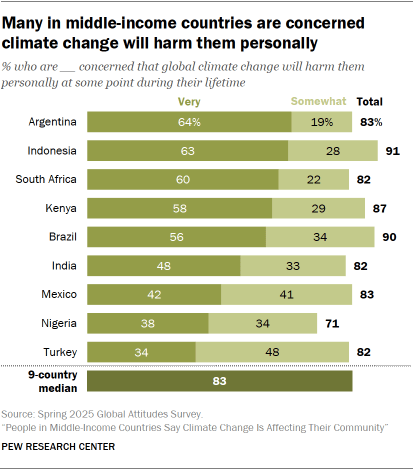

While many continue to express concern that climate change will harm them personally, the share saying this has decreased since 2015 in Argentina, Brazil, India, Mexico and Nigeria. Concern is up, on the other hand, in Indonesia (+18 percentage points), South Africa (+13) and Turkey (+7). Opinion is largely unchanged in Kenya.
When asked which of four possible effects of climate change concerns them most, respondents named droughts or waters shortages more than twice as often as any other option. Fewer say long periods of unusually hot weather, floods or intense storms, or rising sea levels concern them most.
Since 2015, the share pointing to droughts as their biggest concern is up in Indonesia, Mexico, South Africa and Turkey.
Why these countries?
We surveyed 25 countries in spring 2025, including 16 high-income countries and nine middle-income countries as classified by the World Bank. The nine middle-income countries included in this report are Argentina, Brazil, India, Indonesia, Kenya, Mexico, Nigeria, South Africa and Turkey. Surveys in these countries were conducted face-to-face, a mode that gives us more time with respondents to explore topics we might not otherwise be able to. By comparison, respondents in high-income countries were surveyed over the phone or online. For more on our survey methods, read the country-specific methodologies.
Dealing with climate change
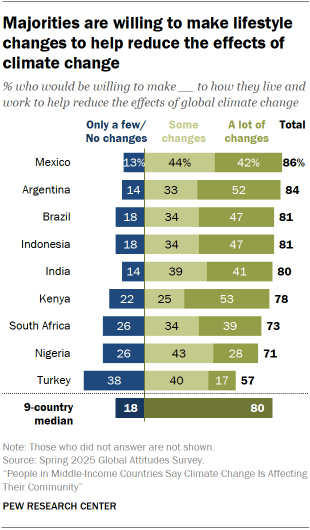
Most people across the middle-income countries surveyed – a median of 80% – are willing to make at least some changes to how they live and work to help reduce the effects of climate change. A median of 18% say they would be willing to make only a few or no changes at all. The shares saying they would make a lot of changes range from 17% in Turkey to 53% in Kenya.
And most – a median of 62% – express confidence in the international community’s ability to significantly reduce the effects of climate change. Seven-in-ten adults or more in India, Indonesia and Kenya have at least some confidence that the actions of the international community will reduce effects of climate change. But around half or fewer agree in Argentina, Mexico and Turkey.
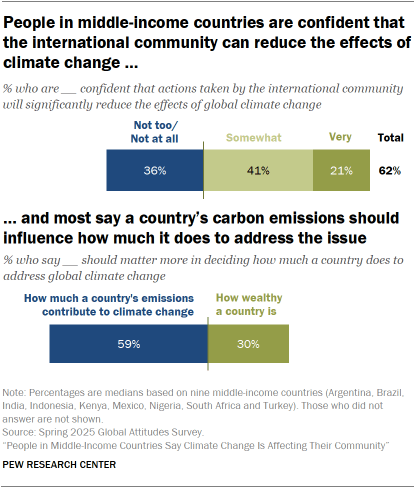
One major international actor is the United Nations, which has been targeting environmental issues since the 1970s. In six of the nine middle-income countries surveyed, people with a favorable view of the UN are more likely than those with an unfavorable view to have confidence in actions taken by the international community.
Related: United Nations seen favorably by many across 25 countries
We also asked people which factor should matter more in deciding a country’s responsibility to address climate change: its wealth or its carbon emissions. A 59% median say carbon emissions are the more important consideration. On balance, this is the most common view in every country except Turkey, where opinion is divided.
Young adults more willing to make lifestyle changes to reduce climate change
Age is a factor in views of the impact of climate change and how to handle it. Across most of the nine middle-income countries, younger people (ages 18 to 34) are more likely than older people (ages 50 and older) to say they would be willing to make some or a lot of changes to the way they live and work to help reduce the effects of climate change.
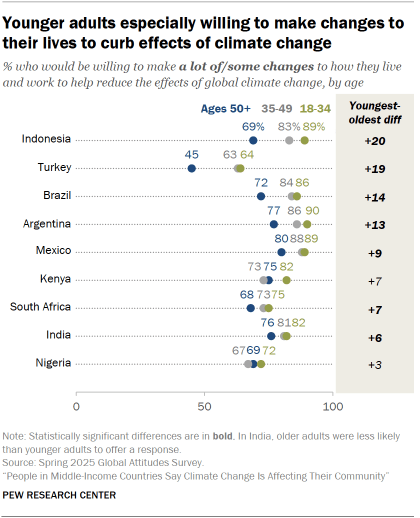
Young adults in India, Indonesia, Turkey and Mexico are also more likely than older people to be concerned that climate change will harm them in their lifetime.
(In India, older adults were less likely to provide a response on both questions.)
In five countries, younger people are more likely than older people to say the amount a country contributes to carbon emissions should matter more than how wealthy a country is in deciding what to do to address climate change, though older adults in these countries are less likely to provide an answer.
